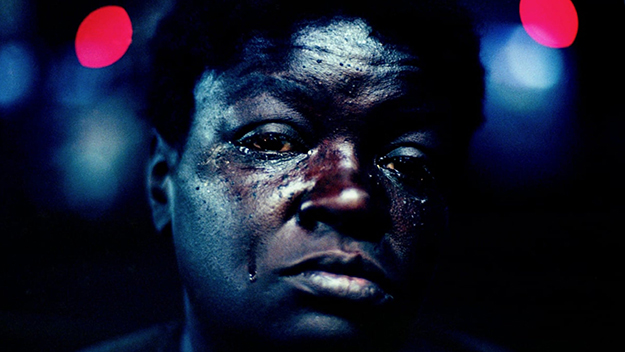Film of the Week: Online Festivals

IWOW: I Walk on Water (Khalik Allah, 2020)
Thank goodness for Sundance, Rotterdam, Berlin, and all the other events around the world that were our last gasp of festival-going, until further notice. How churlish I now feel after complaining that most of the cafes and restaurants around Berlin’s Potsdamer Platz were shut—at least some of them were open, and we weren’t afraid to go into them. Let’s not sound too tragedy-stricken: it’s better to lose festivals temporarily than people permanently. Even so, for travel-prone cinephiles, and the cinema community whose livelihood is seriously threatened, the year ahead is a strange and unpredictable one—as if it isn’t for everyone else—with key events being cancelled or postponed, from SXSW to the Edinburgh International Film Festival, originally scheduled as far ahead as June.
Even in these circumstances, Cannes maintained its own sense of suspense. This week the organizers finally announced that the Festival would not take place in May, but said that they were considering possibilities including moving it to the cusp of June/July—which for the cynical might prompt the same sort of “C’est ça, oui” response as the British government’s bullish announcement that we can all get COVID-19 licked in 12 weeks (well, let’s always hope). Until this week, however, the Festival’s refusal to commit itself was a choice bit of Gallic comedy. On March 11, trade organ Screen Daily reported that festival president Pierre Lescure—pictured on the Riviera seafront—was “optimistic” about the Festival taking place as planned, prompting one wit to post the succinct comment: “King Canute.” My personal theory was that the Festival would indeed happen—but that the only person allowed to attend would be one-time persona non grata Lars von Trier (what a great conceptual art opportunity: they could show his feature Epidemic on a permanent loop in an empty Palais). Rumors that Cannes would go virtual prompted an array of imaginative Twitter suggestions: that an online screening system would have to be as hierarchical as the real thing, with top-quality resolution for the prized white press passes, slightly less good for pink, and patchy or worse for blues and below; or that virtual attendees would be required to queue for an hour to get into their own living rooms.
Queuing, of course, is one thing that you miss when festivals go online, for better or worse: it fosters a sense of community, and that’s what we’ll all need to sustain over the next few months, in the cinema sphere as everywhere else. But while events have been cancelled worldwide, several have taken the venturesome decision to go online. Alternative ways of watching together—at a distance—and talking can keep the global conversation going, and sustain the morale of practitioners and viewers alike. The usual forums, WhatsApp groups, and the like will come into their own, conferencing platforms like Zoom will be one way that people can literally talk to each other, and the idea of impromptu micro-communities scheduling themselves to watch films simultaneously, then argue about them, could see the traditional idea of the film club reborn in a radically different way.
While platforms like MUBI, Filmatique, and the Criterion Channel offer diverse and sometimes bracingly non-mainstream alternatives to the hegemony of Netflix, Amazon, and Disney +, we’re likely to see a proliferation of appetizing pop-up platforms from the festivals themselves. For starters, the BFI’s LGBTQI+ festival Flare has announced a selection of films to go online between March 20-29, along with live Q&As and daily curated recommendations. One film to watch out for that chimes with the social distancing theme is Don’t Look Down, a terrific chamber piece by veteran French duo Olivier Ducastel and Jacques Martineau, about a group of people, male and female, in a high-rise Paris apartment, interacting and exchanging confidences about their lover, who happens to be in the next room, definitely not self-isolated: it’s a wonderfully tense study in the power and the erotics of enclosure, and the photography, by Manuel Marmier, revels in a color scheme that’s like no other.
Also streaming is CPH: DOX (March 18-29). The program includes one inspiring and very enjoyable film about surviving—and making cinema—regardless, while under fire: Irina Tsilyk’s documentary The Earth Is Blue As an Orange, about a young woman trying to get her place in film school, shooting a movie with her family about life in the Ukrainian conflict zone. A key U.S. title, meanwhile, is IWOW: I Walk on Water, an extended look at—among other things—life on the streets of Harlem by artist-photographer Khalik Allah, who made his name as a filmmaker with 2015’s hour-long Field Niggas.
Other platforms currently offering selections are IDFA, the Ischia Film Festival, and Artifa (the International Festival of Films on Art), till March 29, with selections including Mingus Erectus, Amaury Voslion’s 2018 doc about the jazz titan, and Linda Hoagland’s Edo Avant Garde, which proposes that the Japanese artists of the Edo era, which began in the early 1600s, were the pioneers of modern art.
And while we’re all musing on the state of the planet, the D.C. Environmental Film Festival goes online till March 31 with a selection including Todd Haynes’s Dark Water, Oscar-nominated beekeeping documentary Honeyland, two from Chile’s Patricio Guzman, Nostalgia for the Light, and The Pearl Button, and much more besides. On the homefront at Film at Lincoln Center, Bacurau, a selection of The New York Film Festival and Cannes, is now available for streaming here.
Fluff up those sofa cushions, pour yourself that cocktail and dig in: cinema is still out there, and indoors too while we are.
Jonathan Romney is a contributing editor to Film Comment and writes the Film of the Week column. He is a member of the London Film Critics Circle.







